An Old Tin Van Page
I
Bei Dao
Zbigniew Herbert
Zagajewski
R. Carver
Milosz
Bolano Poems
Charles Simic
Brodsky
Borges
Cavafy_Ithaca
Octavio Paz
Thu 2013
NXH's Poems of the Night
Lửa & Khoa Hữu & Celan
TNH Poems
Haiku_Buson
Xmas 26 Dec 1999
Mark Strand
Mahmoud Darwish
W.S. Merwin
TTT_9_Years
Trang thơ Dã Viên
The Lunatic by Simic
Map by Szymborska
Serbian Poetry ed by Simic
Baczinski by AZ
A Defense of Ardor by AZ
Thơ Joseph Huỳnh Văn
Emily Dickinson 1
Wallace Stevens
Tomas Transtromer
Paul Celan
Cầu Mirabeau
Cesar Vallejo
In Lima ... In Lima it's raining
foul water from a mortifying
sorrow. It's raining
through the leak of your love.
Don't pretend that it's sleeping,
remember your troubadour;
because now I understand .. .I'm grasping
the human equation of your love.
It thunders on the mystic dulcimer,
the gem stormy and treacherous,
the witchery of your "yes."
Moreover, it falls, the downpour
falls on the coffin of my path,
where I gnaw my bones for you ...
Cesar Vallejo: The Black Heralds
Je voudrais que mon amour meure
qu' il pleuve sur le cimetière
et les ruelles où je vais
pleuvant celle qui crut m'aimer
Samuel Beckett
Bản tiếng Anh của chính tác giả:
I would like my love to die
and the rain to be raining on the graveyard
and on me walking the streets
mourning her who thought that she loved me
Bản của Gấu:
Gấu muốn tình Gấu chết,
Và mưa rơi trên nghĩa địa,
trên đường phố [Sài Gòn] Gấu đã từng
vừa đi vừa khóc
người
tưởng
rằng người yêu Gấu
John Montague, ngưòi điểm tập
thơ, cũng là bạn của Beckett, có 1 lý thuyết [an almost-theory], về Beckett
làm thơ: Thay vì cố gắng làm thơ mới, Beckett trải qua hầu hết thì giờ
để dịch thơ của ông, một việc làm mà chính ông than, nặng quá,
đếch chịu nổi, a burden he often found intolerable.
We are grateful to Grove Press for allowing us to reprint the originals here.
[The Paris Review Winter 2015]
vive rnorte ma seule saison
lis blancs chrysanthèmes
nids vifs abandonnés
boue des feuilles d'avril
beaux jours gris de givre
alive dead only season mine
white lilies feverfews
vivid nests forsaken
silt of April leaves
frost fair hoar grey days
ce qu'ont les yeux
mal vu de bien
les doigts laissé
de bien filer
serre-les bien
les doigts les yeux
le bien revient
en mieux
what good the eyes
have ill seen
good the fingers
have let escape
close them tight
the fingers the eyes
good is back
better still
ce qu'a de pis
le coeur connu
la tête pu
de pis se dire
fais-les
ressusciter
le pis revient
en pire
what worse
the heart has known
worse the head
to itself said
make them
resuscitate
worse is back
worst still
le nain nonagénaire
dans un dernier murmure
de grâce au moins une bière
grandeur nature
the dwarf in his last
nonagenarian gasp
for mercy's sake at least
a full-size coffin
fous qui disiez
plus jamais
vite
redites
fools who said
nevermore
quick
say it again
pas davantage
de souvenirs qu'à l’âge
d'avril un jour
d'un jour
no more
memories than at the age
of April one day
of a day
- Translated from the French by Edith Fournier
Beckett có 1 từ, ông chuyển từ tiếng Pháp qua tiếng Anh, nhưng khi chuyển lại tiếng Tẩy, thì từ gốc không xứng với nó.
Trên TV có từ thần sầu này, nhưng không làm sao kiếm.
Bài thơ trên đây, tuy được tác giả gật đầu OK, nhưng bây giờ kiếm thấy, và đây là lần in thứ nhất của nó. (1)
Có nhiều câu đúng điệu Beckett, “nửa đêm, mưa, tớ về nhà, không phải nửa đêm, không phải mưa.”
Khi ông mới xuất hiện, gần như chẳng ai chịu nổi thứ văn này, nhưng bây giờ thì quá tuyệt
Sống chết mùa độc nhất của tớ
Huệ trắng
Tổ chim sặc sỡ bỏ hoang
Mùn lá tháng Tư
Ngày đẹp xám màu sương giá
(1). Sự thực, không đúng như tờ Paris Review. Bài thơ chưa từng in ấn này, đã xuất hiện, trong Selected Poems 1930-1989, nhưng chỉ có khổ đầu. NQT
Bài này, cũng tuyệt, trong Selected Poems 1930-1989
Tous les arbres toutes leurs branches toutes leurs feuilles
L'herbe à la base les rochers et les maisons en masse
Au loin la mer que ton oeil baigne
Ces images d'un jour après l'autre
Les vices les vertus tellement imparfaits
La transparence des passants dans les rues de hasard
Et les passantes exhalées par tes recherches obstinées
Tes idées fixes au cceur de plomb aux lèvres vierges
Les vices les vertus tellement imparfaits
La ressemblance des regards de permission avec les yeux
que tu conquis
La confusion des corps des lassitudes des ardeurs
L'imitation des mots des attitudes des idées
Les vices les vertus tellement imparfaits
L'amour c'est l'homme inachevé,
All the trees all their boughs all their leaves
The grass at the base the rocks the massed houses
Mar the sea that thine eye washes
Those images of one day and the next
The vices the virtues that are so imperfect
The transparence of men that pass in the streets of hazard
And women that pass in a fume from thy dour questing
The fixed ideas virgin-lipped leaden-hearted
The vices the virtues that are so imperfect
The eyes consenting resembling the eyes thou didst
vanquish
The confusion of the bodies the lassitudes the ardours
The imitation of the words the attitudes the ideas
The vices the virtues that are so imperfect
Love is man unfinished.
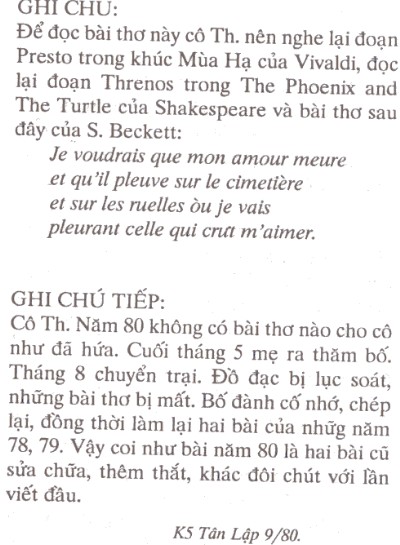
I knew if you had died that I should grieve
Yet I found my heart wishing you were dead.
Tôi biết nếu bạn chết tôi sẽ đau khổ
Vậy mà thâm tâm tôi lại mong điều đó.
Bài thơ không đề của Beckett, là từ hai câu thơ trên, của bạn ông.
Bài thơ trên, lần đầu Gấu đọc, là ở trong Thơ ở đâu xa của TTT.
Nhưng, thú vị nhất, hay đúng hơn, thê lương nhất, lại là cái tít của bài viết của Tolbin. Về những năm tháng thê thảm của Beckett, thời kỳ 1930-1936, Tolbin viết: Vấn đề của ông trong những năm này xem ra thật dễ, nhưng lại khó giải quyết: it was how to live, what to do, and who to be, sống thế nào, làm cái gì, là thằng gì. Ông [Beckett] thì khôn khéo [clever], có học [well-educated], ông nói rành tiếng Anh, tiếng Ý, tiếng Đức của ông thì thật tốt. Nhưng cuốn sách đầu, truyện ngắn, của ông không bán được, và ông không làm sao kiếm được nhà xb cho tiểu thuyết của ông. Ông không biết làm cách nào kiếm sống.
Rất nhiều giai thoại thật tuyệt vời về chuyện Beckett mê tranh của Jack Yeats. Tình bạn giữa ông và McGreevy là cũng từ chuyện mê tranh Yeats.
je suis ce cours de sable qui glisse
entre le galet et la dune
la pluie d'été pleut sur ma vie
sur moi ma vie qui me fuit me poursuit
et finira le jour de son commencement
cher instant je te vois
dans ce rideau de brume qui recule
où je n'aurai plus à fouler ces longs seuils mouvants
et vivrai le temps d'une porte
qui s'ouvre et se referme
my way is in the sand flowing
between the shingle and the dune
the summer rain rains on my life
on me my life harrying fleeing
to its beginning to its end
my peace is there in the receding
mist
when I may cease from treading these long shifting
thresholds
and live the space of a door
that opens and shuts
Samuel Beckett in Collected Poems in English & French. Grove Press.
Bản tiếng Tây theo tôi tuyệt hơn
bản tiếng Anh, cũng của Beckett:
la pluie d'été pleut sur ma vie
sur moi ma vie qui me fuit me poursuit
Mưa
hạ mưa trên đời tôi
Trên tôi đời tôi chạy trốn tôi rượt đuổi tôi
Lại nhớ mưa Sài Gòn!
More and more, along the shore
of the Northeast Corridor,
birds are standing in alcoves like telephone booths
as the humans go by—
doorless ceilingless closets in walls of reed
whose floors are the banks, awash in water,
of inlets and bays.
Large wading birds step back into green recesses,
and stand very still,
sometimes more than one in the narrow space,
sometimes a blue heron and a great egret facing each other
beak to beak. Some birds do not stand,
they grip a branch with their feet to stay upright.
Some birds hop, bouncing along
like little pocketless kangaroos,
and a crow walks along with coins singing in her trousers.
But many birds freeze when they see us,
like a horror movie—a scene in a house
where a killer has a special room.
Herons, egrets, ibises, bitterns,
storks, cranes, coots, rails
fall silent, struck motionless at our advent.
Some sidestep, for safekeeping, into extinction.
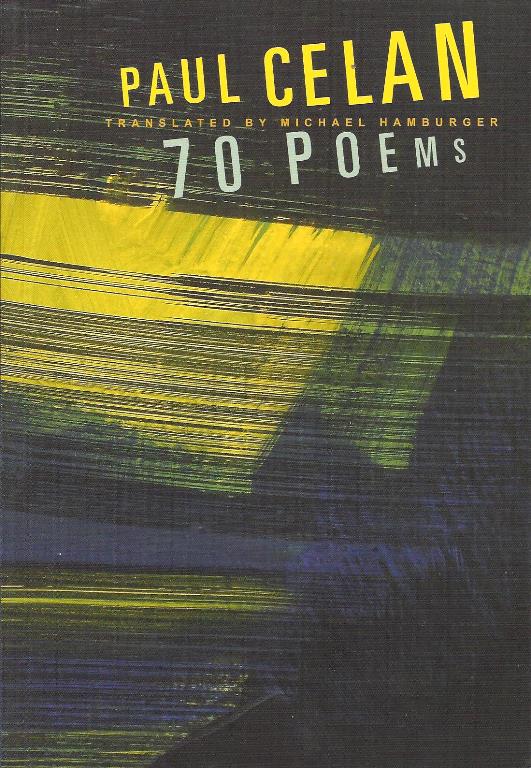
dove-coloured as yesterday,
snowfall, as if even now you were sleeping.
White, stacked into distance.
Above it, endless,
the sleigh track of the lost.
Below, hidden,
presses up
what so hurts the eyes,
hill upon hill,
invisible.
On each,
fetched home into its (oday,
an I slipped away into dumbness:
wooden, a post.
There: a feeling,
blown across by the ice wind
attaching its dove- its snow-
coloured cloth as a flag.
Ungeschriebenes, zu
Sprach verhärtet […]
Du non-écrit, durci
en langue […]
Về cái không-viết ra, cứng lại
thành ngôn ngữ […]Note: Thấy, trên Gió O, Thầy Đạo cũng đang thuyết giảng về Paul Celan.
Ông này, cũng như Beckett, rất khó đọc, khó dịch, và điều kiện bắt buộc, phải giỏi/quen/ rất thành thạo, khi sử dụng tiếng Mít.
Câu trên, từ hỏng nhất, là thành, thành ngôn ngữ.
en langue, trong tiếng nói, trong ngôn ngữ, mới đúng.
GCC dịch, về cái không viết, cứng rắn, trong ngôn ngữ.
Gấu nghi, Thầy thuyết giảng, nhưng cũng không tin tưởng cho lắm, có người thực sự đọc!
Thơ Mỗi Ngày
Durcir en: cứng rắn thành, và thêm, mi dốt tiếng Tây quá, mà cũng bày đặt!
NQT
Cái chuyện dốt tiếng Tây, thì tất nhiên, đâu phải tiếng Mít. Trên talawas, 1 vị độc giả đã từng lôi những chỗ thầy Đạo dịch sai, mà sai thật, Thầy đếch thèm trả lời.
Thầy thua… GCC ở chỗ đó. Trên TV, bất cứ trường hợp nào dịch sai, được độc giả chỉ cho thấy, thì đều có phúc đáp, có cám ơn. Trường hợp ở đây, cũng vậy. Thầy có thể thẳng thắn trả lời, durcir đi với en, cứng rắn thành. Có sao đâu.
Theo GCC, "trong" hợp lý hơn "thành". Đây là giới từ, khi chuyển qua tiếng Việt, sử dụng từ nào hợp lý nhất, là tuỳ người dịch.
Lần gặp Thầy Đạo, lần đầu qua Cali, 1998, ở tiệm sách VK, của DDT, ở Tiểu Sài Gòn, Thầy rất bực khi GCC không nhớ ra Thầy. Người phán, mi không nhớ ta sao, ta đã từng đi tới nhà mi, khi còn ở hẻm Đội Có, Phú Nhuận, cùng với ông anh của BHD. Ông nói thì Gấu nhớ mang máng đã từng gặp, như thế thực.
Và nếu như thế, thì ông học sau GCC. Khi ở hẻm Đội Có, là Gấu được Bà Trẻ đem về nuôi, đã xong hai cái bằng Tú Tài, đang học Toán Đại Cương. Do không có tiền mua sách, ngoài cái cours quay ronéo, cuối năm, đi thi, chẳng hiểu cái đầu bài toán thi đó, nó là cái gì, GCC bỏ phòng thi ra về. Liền sau đó, thấy báo loan tin Ty Cảnh Sát Gia Định tuyển biên tập viên, Gấu bèn nạp liền, nhận liền, vì dễ có ai có cả hai cái bằng Tú Tài như Gấu. Về khoe với Bà Trẻ, hết đói rồi, Bà mắng, mi đến lấy ngay cái đơn, xé bỏ, gia đình nhà mi không có mả đánh người!
Truyện này kể rồi, nhưng quả là nó ám Gấu cả đời.
Nếu như thế, thì đó cũng là lần đầu tiên, Gấu biết đến ông anh của BHD. Ông vô thăm 1 người bạn ở trong hẻm, không phải GCC.
Sau đó, đọc tin Trường Quốc Gia Bưu Điện mới thành lập, mở kỳ thi lấy sinh viên, học hai năm, thay vì ba năm, điều kiện phải có bằng Tú Tài Hai. Gấu thi, đậu, nhưng không đi học, vì chê, ra trường, lương chỉ số 350, chỉ số lương Cán Sự, vẫn còn nhớ, thua, nếu ra trường Đại Học Sư Phạm, lương kỹ sư!
Bỏ Toán Đại Cương, qua học Toán Lý Hóa, MPC, cuối năm, thi rớt. Cái sự thi rớt này, cũng là do quá kiêu ngạo mà ra. Hình như cũng đã kể ra rồi. Đến Bưu Điện, lấy lại cái hồ sơ, trong có cái bản sao chứng chỉ Tú Tài Hai, vì tiền đâu mà lại đi sao 1 bản khác nữa, ông thầy giám thị biểu Gấu, mi ngu quá, nghèo như mi, thì sao không học Bưu Điện cho xong đi, rồi đi làm, rồi có tiền, muốn học gì thì học. Gấu nghe bùi tai quá, bèn nói, nhưng em bỏ mất 1 năm học rồi, làm sao học. Ông nói, để ta nói với Thầy hiệu trưởng. Thầy Trần Văn Viễn. Ông gọi vô, hỏi, năm rồi, mi học đâu, em - học sinh Miền Nam, thưa thầy, em, khác Bắc Kít, thưa thầy, con - học MPC. Ông bèn lôi tới cái bảng đen, ra ngay 1 bài toán, Gấu giải như máy - thực sự là thế - Thầy rất mừng, bèn gật đầu, cho vô học năm thứ nhì.
Vẫn còn nhớ, khi học, Gấu có thói quen, gác chân lên cái ghế trống phía trước, và bị 1 ông Thầy, kỹ sư Tuân, cũng từ Pháp về cùng 1 đợt với Thầy Viễn, bực lắm, nhưng Thầy lại không nói ra, nhưng Gấu biết, Thầy không ưa Gấu, nên khi ra trường, học cours của Thầy thật là kỹ. Đến kỳ thi, bài thi của Thầy, Gấu không làm được, vì nó thuộc phần học quá dễ, Gấu bỏ qua, vì nghĩ trong bụng, ông Thầy này không ưa ta, chắc là ra bài thực khó.
Thế là ông đánh rớt.
Thầy Viễn biết, bèn hỏi, Thầy Tuân nói, tôi hỏi nó 1 câu thật dễ, nó không trả lời được, Thầy Viễn cười, anh hỏi nó 1 câu thật khó, mới đúng, vì nó, nhất trong mấy đứa đó!
Ui chao, Thầy quá thương, quá hiểu trò!
Cái tính cực kỳ kiêu ngạo của Gấu Cà Chớn, là do cái sự Gấu cực kỳ giỏi về Toán, mà ra!
Hà, hà!
Mấy đứa cháu, cháu ngoại, như Jennifer, thằng Lùn Richie, cũng giỏi Toán. Jennifer đi thi toán, toàn liên bang Canada, về nhì!
Cái sự thù hằn của Thầy Đạo với GCC, nếu có, thì thực là quái dị, vì Gấu có bao giờ đọc ông đâu, và ông có viết cái gì đâu mà đọc?
Thấy ông khoe, ông đã từng viết cho Sáng Tạo, và nếu như thế, thì còn là đàn anh của Gấu.
Lần đầu tiên Gấu biết tới ông, là lần ông viết trên talawas, tố Gấu với em Sến, Bắc Kít, là tên đó không phải dân khoa bảng!
Cũng là lần ông tố Thầy của ông ta, là Nguyễn Văn Trung, thuổng 1 bài viết cùa 1 tên Tây mũi lõ!
Những sự kiện này, trên talawas,chắc là vẫn còn.
Luôn cả bài viết của 1 độc giả chê Thầy Đạo dịch sai tiếng Tẩy, khi đọc Linda Lê. (1)
(1)
Margaret Nguyen
Cộng đồng Pháp ngữ Việt Nam, lạc quan hay bi quan?Linda Lê viết:
«Mon père apparaît, disparaît entre les ruines. Je suis sa trace»
Đào Trung Đạo dịch: «Cha tôi xuất hiện rồi biến mất giữa những đống đổ nát. Tôi là dấu vết của ông».
Một câu ngây ngô!
Chỉ con nít đang học chia động từ «être» thì mới nhắc lại như vẹt rằng «je suis - tôi là, tu es - anh là, il est – nó là...».
«Suis» ở trong câu của Linda Lê phải được hiểu là động từ «suivre» - «đi theo».
Tóm lại, câu trên phải dịch đơn giản như vầy: «… Tôi đi theo dấu vết của ông».
Nhật ký Tin Văn
Theo GCC, ngay khi đọc được/được đọc, 1 độc giả, sửa cho mình 1 cái lỗi dịch sai như trên, là phải đi 1 cái mail, gửi "em" Sến, xin cho đăng 1 lời cảm ơn người sửa sai cho mình rồi.
Thầy Đạo, vờ.
Chính là từ cái sự vờ này, ra điều mà Brodsky phán, mỹ là mẹ của đạo hạnh, và từ đó, ra câu của Dos, cái đẹp sẽ cứu chuộc thế giới, [chứ không đạo hạnh], và ra câu của Roland Barthes, khi ông hiểu ra được ý của Kafka, khi Kafka cho rằng, kỹ thuật là hữu thể, être, being, của văn chương. Viết như thế nào, how, chứ không phải tại sao, why, viết.
Không đơn giản đâu, cái sự vờ này!
Tếu nhất, thiếu “mỹ” nhất, là cái vụ Thầy điểm sách của 1 tên mũi lõ, và ông này mail “phúc đáp”.
Thầy kể là ông này cũng triết gia, thế là hai bên nói chuyện tương đắc lắm.
Hóa ra không phải vậy, vì bà chủ báo sau đó, cho công bố cái mail của vị độc giả.
Ông ta cằn nhằn, viết về sách của tôi, mà để cái hình 1 tay dịch, sách của tôi!
Cú này, ThảoTrường bị rồi. Ông được 1 website của 1 nhà văn Mít hải ngoại, vì mục đích bảo tồn nọc độc văn hóa Mỹ Ngụy, đưa lên trang của ông.
Cái trang này, lâu quá quên tên, bạn vô, có thể đọc, nhưng không thể copy. Có điều, ông ta lầm hình Thảo Trường, với 1 ông khác, hình như là Thế Uyên.
Thảo Trường biểu Gấu, ông rành ba cái web wiếc, ông làm ơn nói, sửa giùm.
(1)
Một bữa Hai Lúa trong khi bay lượn trên không gian ảo, tình cờ lạc vô trang VHNT, của Nguyễn Ý Thuần. Ông là một trong những nhà văn đã từng được nhà phê bình lớn và còn là học giả ở trong nước, là Hoàng Ngọc Hiến, nhắc tới, suýt soa, đây là thứ văn chương vượt lằn ranh Quốc Cộng, tới cõi nhân bản...
[Xin xem bài của HNH viết về VHHN].
Thú thực, đó là lần đầu tiên, Hai Lúa biết tới tên ông NYT này.
Coi sơ sơ, tới mục giới thiệu những nhà văn tác phẩm của họ, HL thấy tên nhà văn Thảo Trường. Ông này HL quá quen, nhưng ơ kìa, nhìn hình kìa, không phải là ông Thảo Trường từ xưa tới giờ. Đọc tác phẩm thì đúng là ổng, nhưng hình không phải ổng.
Thế rồi bận bịu, quên luôn, cho tới một bữa ông TT viết mail, này, ông Gấu [xin lỗi bà Gấu phải lập lại từ này], tôi nghe nói, có ai đó post tác phẩm, hình, tiểu sử của tôi, nhưng hình thì không phải. Tôi không quen sử dụng net, phiền ông liên lạc giùm.
Hai Lúa bèn mail cho nhà văn lớn Nguyễn Ý Thuần, nói rõ câu chuyện, lại còn đề nghị, nếu cần hình nhà văn mập TT, sẽ sẵn sàng mail tới.
Đếch thèm trả lời.
Nhưng coi lại, hình của nhà văn mập đã được hạ xuống!
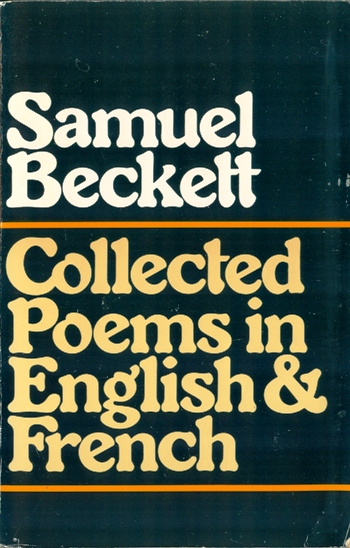
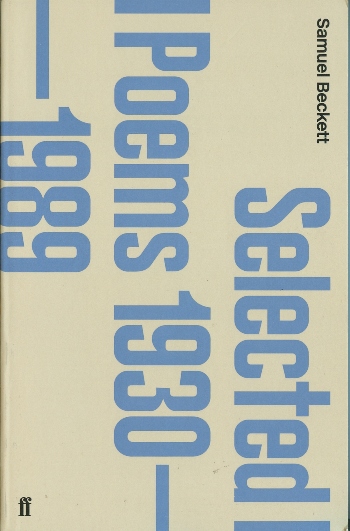
L’amoureuse
Elle est debout sur mes paupières
Et ses cheveux sont dans les miens,
Elle a la forme de mes mains,
Elle a la couleur de mes yeux,
Elle s'engloutit dans mon ombre
Comme une pierre sur le ciel.
Elle a toujours les yeux ouverts
Et ne me laisse pas dormir.
Ses rêves en pleine lumière
Font s'évaporer les soleils,
Me font rire, pleurer et rire,
Parler sans avoir rien à dire.
She is standing on my lids
And her hair is in my hair,
She has the colour of my eye,
She has the body of my hand,
In my shade she is engulfed
As a stone against the sky.
She will never close her eyes
And she does not let me sleep.
And her dreams in the bright day
Make the suns evaporate,
And me laugh cry and laugh,
Speak when I have nothing to say.
Samuel Beckett: Selected Poems 1930-1989
Tóc nàng trong tóc tôi
Dáng nàng trong tay tôi
Màu nàng màu mắt tôi
Nàng chìm vào bóng tôi
Như hòn đá trên trời
Mắt nàng không hề khép
Đừng ngủ, đừng ngủ, Gấu Ngu ơi
Và những giấc mơ của nàng đầy ánh sáng
Làm mặt trời bốc hơi
Làm tôi cười, khóc, rồi lại cười
Nói, chẳng biết nói cái gì.
*******
To think,
when one is no
longer young, when one is not yet
old, that one is no longer young,
that one is not yet old, that is
perhaps something.
Nghĩ, khi mi không còn trẻ nữa, khi mi chưa già khằn;
Rằng, mi không còn trẻ nữa; rằng mi già khằn, nhưng chưa chết hẳn
Thì cũng là 1 cái gì rồi
The Swedish poet you will soon
be reading
Prospero.
Nhà thơ Thụy Ðiển sẽ được đọc rất sớm sủa.
Giữa trận cá độ vào phút
chót 100/1 dành cho Bob Dylan, ở 1 nhà cái, thì đùng 1 phát, nhà thơ
ít được người đời biết tới, Tomas Tranströmer, người Thụy Ðiển,
đất nước sở tại, thắng Nobel văn chương.
“Ông là nhà thơ, nhưng chưa từng bao giờ là
người viết toàn thời gian”, tay thư ký thường trực của Viện Hàn Lâm,
Peter Englund, giải thích.
Mặc dù hồi sau này, ông ít viết, do bị 1 cú
sốc tim vào năm 1990 khiến Mr. Tranströmer bị liệt, nhưng đây là
nhà thơ được yêu mến ở Thụy Ðiển, nơi tên của ông được nhắc tới đã
nhiều năm mỗi lần Nobel. Thập niên vừa rồi,
một ông phó nhòm, cứ tới mùa lá rụng trong vườn, là bèn
túc trực nơi cửa nhà ông, để kịp bấm máy.
Sinh năm 1931, Mr Tranströmer bắt đầu in thơ từ những
năm đầu đời, thuở làm thơ yêu em như một nhà thơ Mít viết, và,
khi người ta hai mươi tuổi thì… khiếp lắm. Kể từ đó, thơ của ông được
dịch qua 60 ngôn ngữ. Nhưng túi thơ của ông thì hơi bị khiêm tốn - bạn
có thể nhét gọn vô “cái túi quần sau” của bạn, có thể nói như vậy,
theo ông thư ký thường trực, a not too-large pocket-book, một cái túi
đựng sách không lớn quá. (1)
Mr Tranströmer mần thơ, trong khi mần toàn thời gian,
đầu tiên thì như là một nhà tâm lý học, và rồi thì như là công
chức của Viện Thị Trường Lao Ðộng ở Västerås. Bất cứ 1 cái thứ
vinh danh nào mà ông khoái thì đều thuộc loại trầm lặng, kiệm lời,
kín tiếng. Khi thông báo chiến thắng của Mr Tranströmer, Viện Hàn Lâm
thổi, đây là 1 thứ tác phẩm “kinh tế cao”, bảo đảm cho người đọc 1
lối đi mới mẻ, tươi mát tới thực tại. Ông là nhà thơ thứ nhất, kể từ
khi nữ thi sĩ Ba Lan, Wislawa Szymborska được giải này vào năm 1996.
Tay thư ký Nobel có lẽ phải lèm bèm 1 tí để
bảo vệ sự chọn lựa, [lại một đấng Âu Châu, và hơn thế nữa, đúng 1
đấng ở trong nhà], nhưng quan trọng hơn, tại làm sao ông số 1 lại
là Mr Tranströmer?
Nhưng câu hỏi này, có lẽ nên để chính ông số
1 trả lời, bởi vì chỉ có ông số 1 mới có thể trả lời bằng tác phẩm
của ông, chắc chắn là sẽ được độc giả vồ vập, trong những ngày sắp
tới.
*
Thực tại là của ngôn
ngữ, tiết kiệm là của nhà thơ. Brodsky
Cái đặc trưng kinh tế cao, là đặc trưng của thơ.
Thơ là phải như thế.
Ðâu phải trường ca cà chớn như ở xứ Mít?
Làm 1 câu thơ chưa nên thân, mà động đến là
ỉa ra cả 1 đống!
(1)
Today at 12:55 PM
Anh Gấu tối ngày mua sách-bỏ-túi để đọc
mà sao dịch "ngộ" rứa ?
a not too-large pocket-book, một cái túi đựng sách không lớn quá.
Theo K, nó có nghĩa là số lượng thơ của ông chỉ chứa đầy một cuốn
sách loại bỏ túi (áo, quần) không dày lắm .
Webster : 1. often pocket book : a small especially paperback book
that can be carried in the pocket .
Chứ còn pocket với nghĩa là túi xách thì chỉ dùng đựng tiền mặt
hoặc giấy tờ thôi.
Tks & Take Care & Happy New Year
GCC
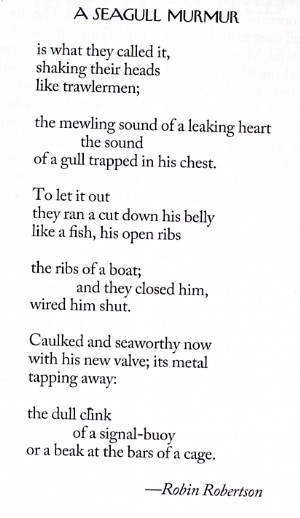
Note: Ông này là 1 trong
những dịch giả thơ TT, và là tác giả bài viết Translating Tomas Tranströmer, Dịch TT
Gấu tính dịch bài thơ
trên, và giữ nguyên cái form của nó trên tờ báo, thay vì scan.
Bởi vì cái tít của bài thơ làm nhớ đến 1 bài
thơ của Gấu.
Trên net, tờ Người Kinh Tế có bài viết về Nobel
văn chương năm nay của Prospero.
GCC mê tay này lắm. Phê bình gia, điểm sách
gia số 1!
Cái chi tiết thần kỳ mà Prospero khui ra từ thơ của Tomas Transtromer, [the Swedish Academy has praised an oeuvre that is “characterised by economy”], làm GCC nhớ tới Brodsky, qua đoạn viết sau đây:
Bài
thơ đâu khác chi một giấc mơ khắc khoải, trong đó bạn có được một
cái chi cực kỳ quí giá: chỉ để mất tức thì. Trong giấc hoàng lương ngắn
ngủi, hoặc có lẽ chính vì ngắn ngủi, cho nên những giấc mơ như thế
có tính thuyết phục đến từng chi tiết. Một bài thơ, như định nghĩa,
cũng giới hạn như vậy. Cả hai đều là dồn nén, chỉ khác, bài thơ, vốn
là một hành vi ý thức, không phải sự phô diễn rông dài hoặc ẩn dụ
về thực tại, nhưng nó chính là thực tại.
Cho dù tất cả sự phổ
quát gần đây của tiềm thức, sự tuỳ thuộc của chúng ta vào
ý thức vẫn lớn hơn. Nếu trách nhiệm bắt đầu (ngay từ) trong giấc mơ,
như thi sĩ Delmore Schwartz đã có lần diễn tả, rốt ráo ra, những giấc
mơ được thể hiện và hoàn tất ở trong những bài thơ. Bởi thật là ngốc
nghếch nếu gợi ý rằng có một đẳng cấp giữa những thực tại phức biệt,
người ta có thể lập luận rằng toàn thực tại hướng vọng tới điều kiện
của một bài thơ: nếu chỉ vì lý do tiết kiệm.
Sự tiết kiệm này là "lý do hiện
hữu" tối hậu của nghệ thuật, và toàn thể lịch sử nghệ thuật
là lịch sử của những phương tiện dồn nén và súc tích. Trong thơ, đó
là ngôn ngữ, tự thân nó, là một bản sao của thực tại được cô đọng
cao độ. Nói tóm lại, bài thơ sản sinh hơn là phản ánh. Vậy nếu một
bài thơ đề cập tới một chủ đề huyền thoại, điều này có nghĩa là một
thực tại quan sát chính lịch sử của nó - hoặc nếu bạn muốn - điều này
có nghĩa là, một hậu quả đặt tấm gương khuếch đại cạnh nguyên nhân
và bị chói loà bởi nó.
Bài thơ "Orpheus.
Eurydice. Hermes" đúng là như thế, bởi nó chính là chân
dung tự hoạ của tác giả với cái kính khuếch đại cầm trên tay, và người
ta, qua bài thơ này, biết được nhiều về tác giả hơn là bất kỳ cuốn tiểu
sử nào về ông có thể cung ứng. Cái tác giả ngắm nhìn chính là cái tạo
nên ông, nhưng kẻ ngắm nhìn thì rõ ràng hơn, bởi vì bạn chỉ có thể ngắm
nhìn một cái gì từ bên ngoài. Đó là sự khác biệt giữa một giấc mơ và
một bài thơ đối với bạn. Có thể nói, thực tại là của ngôn ngữ, tiết kiệm
là của nhà thơ.
Nobel prize for literature
The Swedish poet you will soon be reading
Oct 6th 2011, 18:43
AMID the flurry of last-minute
bets for Bob Dylan (once rated by bookies at 100/1), a relatively
unknown Swedish poet, Tomas Tranströmer, has won the Nobel prize
for literature. “He is a poet but has never really been a full-time
writer,” explained Peter Englund, the permanent secretary of the Swedish
Academy, which decides the award. Though Mr Tranströmer has not written
much lately, since suffering from a stroke in 1990 that left him partly
paralysed, he is beloved in Sweden, where his name has been mentioned
for the Nobel for years. One newspaper photographer has been standing
outside his door on the day of the announcement for the last decade, anticipating
this moment.
Born in 1931, Mr Tranströmer began publishing poems
when he was in his early 20s. He has been translated into 60 different
languages since then. But his output is notably sparse—you “could
fit it into a not too-large pocket-book, all of it,” Mr Englund says.
Mr Tranströmer wrote poetry while working full-time, first as a
psychologist and then at the Labour Market Institute in Västerås.
Any fame he has enjoyed has been of the quiet, understated sort. In
announcing Mr Tranströmer’s victory, the Swedish Academy has praised
an oeuvre that is “characterised by economy” and that grants “fresh
access to reality”. He is the first poet to win the award since Wislawa
Szymborska in 1996.
Mr Englund has had to defend giving the literature
award once more to a European (seven of the last ten have gone to
the continent), and also to a Swede. In doing so, Mr Englund has perhaps
had to deflect attention from the more pressing question of why Mr Tranströmer
won in the first place. Perhaps that is a question that only Mr Tranströmer
can answer, in work that will finally be more widely read.
Tomas Tranströmer – My Nobel prize-winning hero
The literature prize means the world of poetry can finally raise a glass to salute this humble man
Thơ ông là những thám dò vào thế giới nội
tại và những tương quan của thế giới đó với phong cảnh của quê hương
Thụy Điển.
Nguyên tác tiếng Anh:
Tranströmer's
surreal explorations
of the inner world and its relation to the jagged landscape of his native
country have been translated into over 50 languages.
GCC dịch:
Những thám hiểm siêu thực [TQ bỏ từ này] thế giới nội tại, và sự tương quan của nó [số ít, không phải những tương quan] với những phong cảnh lởm chởm [TQ bỏ từ này luôn] của quê hương của ông được dịch ra trên 50 thứ tiếng.
Mấy từ quan trọng, TQ đều bỏ, chán thế.
Chỉ nội 1 từ “lởm chởm” bỏ đi, là mất mẹ 1 nửa cõi thơ của ông này rồi.
Chứng cớ:
The landscape of Tranströmer's
poetry has remained constant during his 50-year career: the jagged
coastland of his native Sweden, with its dark spruce and pine forests,
sudden light and sudden storm, restless seas and endless winters,
is mirrored by his direct, plain-speaking style and arresting, unforgettable
images. Sometimes referred to as a "buzzard poet", Tranströmer seems
to hang over this landscape with a gimlet eye that sees the world with
an almost mystical precision. A view that first appeared open and featureless
now holds an anxiety of detail; the voice that first sounded spare and
simple now seems subtle, shrewd and thrillingly intimate.
[Phong cảnh thơ TT thì thường hằng trong 50 năm hành nghề thơ: miền đất ven biển lởm chởm của quê hương Thụy Ðiển với những rừng cây thông, vân sam u tối, chớp bão bất thần, biển không ngừng cựa quậy và những mùa đông dài lê thê, chẳng chịu chấm dứt, phong cảnh đó được phản chiếu vào thơ của ông, bằng 1 thứ văn phong thẳng tuột và những hình ảnh lôi cuốn, không thể nào quên được. Thường được nhắc tới qua cái nick “nhà thơ buzzard, chim ó”, Transtromer như treo lơ lửng bên trên phong cảnh đó với con mắt gimlet [dây câu bện thép], nhìn thế giới với 1 sự chính xác hầu như huyền bí, thần kỳ. Một cái nhìn thoạt đầu có vẻ phơi mở, không nét đặc biệt, và rồi thì nắm giữ một cách âu lo sao xuyến chi tiết sự kiện, tiếng thơ lúc đầu có vẻ thanh đạm, sơ sài, và rồi thì thật chi li, tế nhị, sắc sảo, và rất ư là riêng tư, thân mật đến ngỡ ngàng, đến sững sờ, đến nghẹt thở.]
Chỉ đến khi ngộ ra cõi thơ, thì Gấu mới hiểu ra là, 1 Nobel văn chương về tay 1 nhà thơ là 1 cơ hội tuyệt vời nhất trong đời một người… mê thơ.
Người ta thường nói, thời của anh mà không đọc Dos, đọc Kafka… thí dụ, là vứt đi, nhưng không được nhìn thấy 1 nhà thơ được vinh danh Nobel thì quả là 1 đại bất hạnh!Hà, hà!
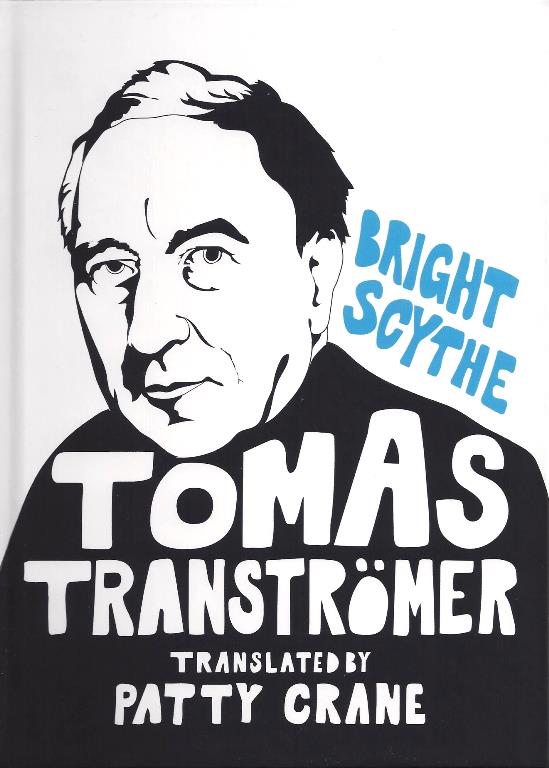
Thí dụ, bài Lament.
It lies there without moving.
It lies there without moving in empty space.
He put the pen down.
So much that can neither be written nor kept inside!
His body, is stiffened by something happening far away
though the curious overnight bag beats like a heart.
Outside, the late spring.
From the foliage a whistling-people or birds?
And the cherry trees in bloom pat the heavy trucks on the way home.
Weeks go by.
Slowly night comes.
Moths settle down on the pane:
small pale telegrams from the world.
Tomas Transtromer: Selected Poems [ed by Robert Hass]
He laid down his pen.
It rests quietly on the table.
It rests quietly in the void.
He laid down his pen.
Too much that can neither be written nor kept inside!
He's paralyzed by something happening far away
although his marvelous travel bag pulses like a heart.
Outside, it's early summer.
From the greenness comes whistling-people or birds?
And blossoming cherry trees embrace the trucks that have returned home.
Weeks go by.
Night arrives slowly.
Moths settle on the windowpane:
small pale telegrams from the world.
Patty Crane: Bright Scythe
Mánh thần sầu. Nói bằng bụng.
Ui chao, bèn nhớ đến Kim Dung.
Đúng hơn, Kiều Phong, trong trận đấu kinh hồn lạc phách ở Tụ Hiền Trang. Kiều Phong mang A Châu tới, năn nỉ Tiết Thần Y trị thương cho nàng, sau khi trúng đòn của Kiều Phong.
Mãnh hổ Nam Kít [Khất Đan] địch quần hồ Bắc Kít [Trung Nguyên]... May được vị đại hán mặc đồ đen cứu thoát.
Trước khi bỏ đi, bèn tát cho KP 1 phát, và chửi, tại sao mi ngu thế, chết vì 1 đứa con gái xa lạ, không quen biết.
Ui chao, lại Ui chao, đây là đòn phục bút, để sửa soạn cho cú tái ngộ Nhạn Môn Quan, Kiều Phong tung A Châu lên trời, như con gà con, chờ rớt xuống, ôm chặt vào lòng, hai ta ra quan ngoại chăn dê, sống đời tuyệt tích, không thèm dính vô chốn giang hồ gió tanh mưa máu…
Trong đời KP, hai lần đánh xém chết người đẹp, hai chị em sinh đôi, đều yêu ông, tếu thế.
Lần đánh A Châu, được Tiết Thần Y cứu, lần đánh A Tử, nhờ đó, tìm lại được xứ Nam Kít của ông, rồi chết vì nó…
Ui chao, lại nhớ Sến. Em chửi - mắng yêu, đúng hơn - sao ngu thế, mất thì giờ với tiểu thuyết chưởng!
Nhắc tới Kiều Phong, ở đây, là do trong trận Tụ Hiền Trang, có 1 tên đệ tử của Tinh Tú Lão Quái, dùng môn "nói bằng bụng" chọc quê KP, bị KP quát 1 phát, bể bụng chết tươi, hà hà!
Môn võ công này, hễ gặp tay nội công cao hơn, là bỏ mẹ!
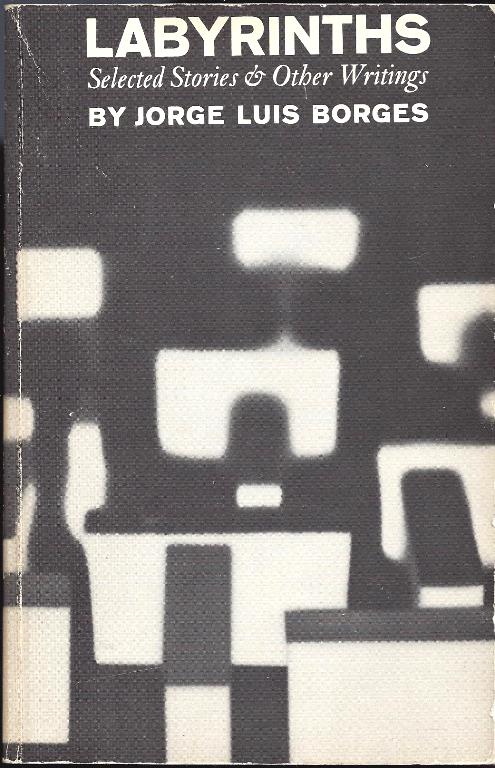
Mê Cung
Thôi đành post bản tiếng Anh vậy.
Maurois coi Borges "đã từng", was, là đệ tử trực tiếp của Kafka, và “Lâu Đài”, có thể do Borges, nhưng nếu là ông, nó sẽ chỉ còn chừng vài trang, do lười và không ưa sự toàn hảo. [Kafka was a direct precursor of Borges. The Castle might be by Borges, but he would have made it into a ten-page story, both out of lofty laziness and out of concern for perfection.]
Gấu đã từng nhận ra điều này, đúng như thế, và cũng đã từng viết ra đâu đó, trên TV. Nhưng có 1 khoảng cách xa vời vợi giữa họ, như giữa mộng và thực. Với Kafka, Lâu Đài là thực, tức thế giới toàn trị.
Jorge Luis Borges is a great writer who has composed only little essays or short narratives. Yet they suffice for us to call him great because of their wonderful intelligence, their wealth of invention, and their tight, almost mathematical, style. Argentine by birth and temperament, but nurtured on universal literature, Borges has no spiritual homeland. He creates, outside time and space, imaginary and symbolic worlds. It is a sign of his importance that, in placing him, only strange and perfect works can be called to mind. He is akin to Kafka, Poe, sometimes to Henry James and Wells, always to Valery by the abrupt projection of his paradoxes in what has been called "his private metaphysics."
Many of his masters are English, He has an infinite admiration for Wells and is indignant that Oscar Wilde could define him as "a scientific Jules Verne," Borges makes the observation that the fiction of Jules Verne speculates on future probability (the submarine, the trip to the moon), that of Wells on pure possibility (an invisible man, a flower that devours a man, a machine to explore time), or even on impossibility (a man returning from the hereafter with a future flower).
Beyond that, a Wells novel symbolically represents features inherent in all human destinies. Any great and lasting book must be ambiguous, Borges says; it is a mirror that makes the reader's features known, but the author must seem to be unaware of the significance of his work-which is an excellent description of Borges's own art. "God must not engage in theology; the writer must not destroy by human reasonings the faith that art requires of us."
He admires Poe and Chesterton as much as he does Wells. Poe wrote perfect tales of fantastic horror and invented the detective story, but he never combined the two types of writing. Chesterton did attempt and felicitously brought off this tour de force. Each of Father Brown's adventures proposes to explain, in reason's name, an unexplainable fact. "Though Chesterton disclaimed being a Poe or Kafka, there was, in the material out of which his ego was molded, something that tended to nightmare." Kafka was a direct precursor of Borges. The Castle might be by Borges, but he would have made it into a ten-page story, both out of lofty laziness and out of concern for perfection. As for Kafka's precursors, Borges's erudition takes pleasure in finding them in Zeno of Elea, Kierkegaard and Robert Browning. In each of these authors there is some Kafka, but if Kafka had not written, nobody would have been able to notice it-whence this very Borgesian paradox: "Every writer creates his own precursors."
Another man who inspires him is the English writer John William Dunne, author of such curious books about time, in which he claims that the past, present and future exist simultaneously, as is proved by our dreams. (Schopenhauer, Borges remarks, had already written that life and dreams are leaves of the same book: reading them in order is living; skimming through them is dreaming.) In death we shall rediscover all the instants of our life and we shall freely combine them as in dreams. "God, our friends, and Shakespeare will collaborate with us." Nothing pleases Borges better than to play in this way with mind, dreams, space and time. The more complicated the game becomes, the happier he is. The dreamer can be dreamed in his turn. "The Mind was dreaming; the world was its dream." In all philosophers, from Democritus to Spinoza, from Schopenhauer to Kierkegaard, he is on the watch for paradoxical intellectual possibilities.
For example, an author, Pierre Menard, undertakes to compose Don Quixote-not another Quixote, but the Quixote. His method? To know Spanish well, to rediscover the Catholic faith, to war against the Moors, to forget the history of Europe-in short, to be Miguel de Cervantes. The coincidence then becomes so total that the twentieth-century author rewrites Cervantes' novel literally, word for word, and without referring to the original. And here Borges has this astonishing sentence: "The text of Cervantes and that of Menard are verbally identical, but the second is almost infinitely richer." This he triumphantly demonstrates, for this subject, apparently absurd, in fact expresses a real idea: the Quixote that we read is not that of Cervantes, any more than our Madame Bovary is that of Flaubert. Each twentieth-century reader involuntarily rewrites in his own way the masterpieces of past centuries. It was enough to make an extrapolation in order to draw Borges's story out of it.
Often a paradox that ought to bowl us over does not strike us in the abstract form given it by philosophers. Borges makes a concrete reality out of it. The "Library of Babel" is the image of the universe, infinite and always started over again. Most of the books in this library are unintelligible, letters thrown together by chance or perversely repeated, but sometimes, in this labyrinth of letters, a reasonable line or sentence is found.
Such are the laws of nature, tiny cases of regularity in a chaotic world. The "Lottery in Babylon" is another ingenious and penetrating staging of the role of chance in life. The mysterious Company that distributes good and bad luck reminds us of the "musical banks" in Samuel Butler's Erewhon.
Attracted by metaphysics, but accepting no system as true, Borges makes out of all of them a game for the mind. He discovers two tendencies in himself: "one to esteem religious and philosophical ideas for their aesthetic value, and even for what is magical or marvelous in their content. That is perhaps the indication of an essential skepticism. The other is to suppose in advance that the quantity of fables or metaphors of which man's imagination is capable is limited, but that this small number of inventions can be everything to everyone."
Among these fables or ideas, certain ones -particularly fascinate him: that of Endless Recurrence, or the circular repetition of all the history of the world, a theme dear to Nietzsche; that of the dream within a dream; that of centuries that seem minutes and seconds that seem years ("The Secret Miracle"); that of the hallucinatory nature of the world. He likes to quote Novalis: "The greatest of sorcerers would be the one who would cast a spell on himself to the degree of taking his own phantasmagoria for autonomous apparitions. Might that not be our case?" Borges answers that indeed it is our case: it is we who have dreamed the universe. We can see in what it consists, the deliberately constructed interplay of the mirrors and mazes of this thought, difficult but always acute and laden with secrets. In all these stories we find roads that fork, corridors that lead nowhere, except to other' corridors, and so on as far as the eye can see. For Borges this is an image of human thought, which endlessly makes its way through concatenations of causes and effects without ever exhausting infinity, and marvels over what is perhaps only inhuman chance. And why wander in these labyrinths? Once more, for aesthetic reasons; because this present infinity, these "vertiginous symmetries," have their tragic beauty. The form is more important than the content.
Such is, for example, the narrative that bears this bizarre title: "Tlon, Uqbar, Orbis Tertius." This concerns the history of an unknown planet, complete "with its architectures and quarrels, with the terror of its mythologies and the uproar of its languages, its emperors and seas, its minerals and birds and fish, its algebra and fire, its theological and metaphysical controversies." This invention of a new world appears to be the work of a secret society of astronomers, engineers, biologists, metaphysicians and geometricians. This world that they have created, Tlon, is a Berekeleyan and Kierkegaardian world where only inner life exists. On Tlon everyone has his own truth; external objects are whatever each one wants. The international press broadcasts this discovery, and very soon the world of Tlon obliterates our world. An imaginary past takes the place of our own. A group of solitary scientists has transformed the universe. All this is mad, subtle, and gives food for endless thought.
Other stories by Borges are parables, mysterious and never explicit; still others are detective narratives in the manner of Chesterton. Their plots remain entirely intellectual. The criminal exploits his familiarity with the methods of the detective. It is Dupin against Dupin or Maigret against Maigret. One of these pieces of "fiction" is the insatiable search for a person through the scarcely perceptible reflections that he has left on other souls. In another, because a condemned man has noticed that expectations never coincide with reality, he imagines the circumstances of his own death. Since they have thus become expectations, they can no longer become realities.
These inventions are described in a pure and scholarly style which must be linked up with Poe, "who begat Baudelaire, who begat Mallarme, who begat Valery," who begat Borges. It is especially by his rigor that he reminds us of Valery. "To be in love is to create a religion whose god is fallible." By his piled-up imperfects he sometimes recalls Flaubert; by the rarity of his adjectives, St. John Perse. "The inconsolable cry of a bird." But, once these relationships are pointed out, it must be said that Borges's style is, like his thought, highly original. Of the metaphysicians of Tlon he writes: "They seek neither truth nor likelihood; they seek astonishment. They think metaphysics is a branch of the literature of fantasy." That rather well defines the greatness and the art of Borges.
ANDRE MAUROIS
of the French Academy
Translated by Sherry Mangan

We have many shadows. I was on my way home
one September night when Y
climbed out of his grave after forty years
and kept me company.
At first he was completely blank, just a name
but his thoughts swam
faster than time ran
and caught up to us.
I put his eyes into my eyes
and saw the war's sea.
The last boat he commanded
rose up from under us.
Ahead and behind the Atlantic convoy crept,
those who would survive
and those who'd been given The Mark
(invisible to all),
while the sleepless hours relieved each other
but never him-
the life vest snug under his oilskin coat.
He never came home.
It was internal crying that bled him to death
in a Cardiff hospital.
He finally got to lie down
and turn into the horizon.
Tomas Transtromer: Bright Scypthe
Một đêm tháng Chín, thì Y
Bò ra khỏi ngôi mộ của anh sau bốn chục năm
Và làm bạn đường với tôi.
Lúc đầu anh hoàn toàn trống trơn, ngoài cái tên
Nhưng những ý nghĩ của anh bơi
Nhanh hơn là thời gian chạy
Và bắt kịp hai đứa chúng tôi
Tôi để cặp mắt của anh vô của tôi
Và nhìn thấy trận thuỷ chiến
Con tầu cuối cùng anh làm thuyền trưởng dâng lên
Bên dưới chúng tôi
Trước và sau đoàn tầu chiến Atlantic loi ngoi
Những người sẽ sống sót
Hay những người được đánh dấu The Mark
(vô hình đối với tất cả)
Trong khi những giờ không ngủ khuây khỏa lẫn nhau
Nhưng không bao giờ anh –
Cái phao bảo hộ ở bên dưới cái áo khoác da dầu của anh
Anh chẳng bao giờ trở về nhà
Chính tiếng khóc ở bên trong anh làm anh chảy máu tới chết
Ở bịnh viện Cardiff
Sau cùng anh nằm xuống
Và biến thành đường chân trời
The great subject of the poetry of Sweden's Tomas Transtromer sometimes seems as though it is his only subject-is liminality. He is a poet almost helplessly drawn to enter and inhabit those in-between states that form the borderlines between waking and sleeping, the conscious and the unconscious, ecstasy and terror, the public self and the interior self. Again and again his poems allude to border checkpoints, boundaries, crossroads: they teeter upon thresholds of every sort-be they the brink of sleep or the brink of death, a door about to open or a door about to close. And these thresholds are often ensorcelled places, where a stone can miraculously pass through a window and leave it undamaged; where the faces of what seem to be all of humanity suddenly appear to the speaker on a motel wall, "pushing through oblivion's white walls / to breathe, to ask for something" ("The Gallery"). Indeed, in one of his finest individual collections, called Sanningsbarriaren in its original Swedish and The Truth Barrier in most English translations, he concocts a neologism which perfectly encapsulates his lifelong fixation with the liminal.
This is, I suppose, Transtromner's canny way of expressing Keats's concept of negative capability. Transtromer is certainly a man who, in Keats's memorable phrase, is "capable of being in uncertainties, Mysteries, doubts:' And yet he differs from Keats insofar as he sees this state not as a goal for the poet to aspire to, but as inevitable-and inevitably anxiety-provoking. In fact, he sees this condition as our fate in contemporary society.
Trong lời giới thiệu bản dịch tập thơ, David Wojahan nhắc tới ý niệm của Yeats, khả năng tiêu cực, Keats’s concept of negative capability. Và tác giả tin rằng, Transtromer đúng là người “có thể ở trong những lưỡng lự, bí hiểm, hồ nghi”, “capable of being in uncertainties, Mysteries, doubts”. Nhưng khác hẳn Yeats, khi cho rằng đây là mục đích, goal, thi sĩ mong tới được, thì Transtromer coi, không thể tránh được. và đây là điều kiện, như là phần số của thi sĩ, trong xã hội đương thời.
when a conversation
is almost a crime
because it includes
so much made explicit?
gửi Bertolt Brecht
Khi tán gẫu là một tội
Bởi là vì nó bao gồm quá nhiều điều
Nhờ tán gẫu mà trở thành dứt khoát?
Gửi Bertolt Brecht:
Thời nào thời này
Khi chuyện trò
là tội ác?
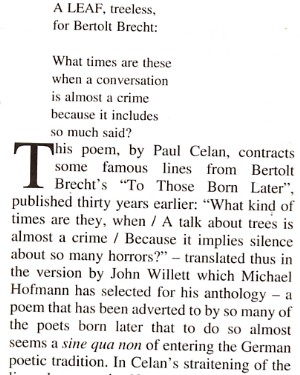
Tại sao thi sĩ,
Trong thời điêu đứng như thế này? Holderlin
V/v u trầm phiêu lãng.
Đây là nói về thi sĩ kiêm tu sĩ có nick là Tu Bụi, lèm bèm về 1 bài thơ của Tẫu, trong có hình ảnh đối sầu miên:
Cuộc gặp gỡ của Gấu với Woolf, cũng tình cờ, cũng "nhiệm mầu", nhưng chưa ghê gớm như của Garcia Marquez. Ông đọc, chỉ một câu, của Woolf, trong Mrs Dalloway, mà nhìn ra, trọn cả tiến trình phân huỷ của Macondo, và định mệnh sau cùng của nó ["I saw in a flash the whole process of decomposition of Macondo and its final destiny"].
*
Lần đầu, là tại một tiệm sách ở Sài Gòn, một ngày đẹp trời lang thang giữa những tiệm sách ở đường Bonnard, (1), tình cờ cầm lên cuốn Bà Dalloway, vào thời điểm mà cả thành phố và lớp trẻ của nó đã, đang, hoặc sẽ đợi cái ngày con quỉ chiến tranh gọi đến tên mình, và trong khi chờ đợi như thế, đọc Sartre, Camus, hoặc trực tiếp, hoặc gián tiếp, cuốn tiểu thuyết của Woolf thật quá lạc lõng, nhưng chỉ tới khi bạn nhập vào một ngày trong đời người đẹp, nhập vào cái giọng thầm thì, hay dùng đúng thuật ngữ của những nhà phê bình, giọng độc thoại nội tâm, dòng ý thức... là bạn biết ngay một điều, nó đây rồi, đây là đúng thứ "y" cần, nếu muốn viết khác đi, muốn thay đổi hẳn cái dòng văn học Việt Nam...
Mấy ngày sau, khoe với nhà thơ đàn anh, về mấy ngày đánh vật với cuốn sách, ông gật gù, mắt lim dim như muốn chia sẻ cái sướng với thằng em, và còn dặn thêm: cậu hãy nghe "tớ", phải đọc đi đọc lại, vài lần, nhiều lần...
Bonnard, hai "n", Gấu viết trật, đã sửa lại, theo bản đồ Sài Gòn xưa, Việt Nam Xưa
Ghi chú về 1 giọng văn: Woolf
Favourite trick Ventriloquism. Woolf was an exponent of the “free indirect style”, whereby the narrator inhabits the voice of the character. In “Mrs Dalloway”, for instance, the following lines are attributed to the narrator, but they are unmistakably Clarissa’s thoughts: “Hugh’s socks were without exception the most beautiful she had ever seen — and now his evening dress. Perfect!” As J. Hillis Miller put it, the narrator is a function of the character’s thoughts in Woolf’s writing, not the other way around – “they think therefore I am.”
Mánh thần sầu. Nói bằng bụng.
Ui chao, bèn nhớ đến Kim Dung.
Đúng hơn, Kiều Phong, trong trận đấu kinh hồn lạc phách ở Tụ Hiền Trang. Kiều Phong mang A Châu tới, năn nỉ Tiết Thần Y trị thương cho nàng, sau khi trúng đòn của Kiều Phong.
Mãnh hổ Nam Kít [Khất Đan] địch quần hồ Bắc Kít [Trung Nguyên]... May được vị đại hán mặc đồ đen cứu thoát.
Trước khi bỏ đi, bèn tát cho KP 1 phát, và chửi, tại sao mi ngu thế, chết vì 1 đứa con gái xa lạ, không quen biết.
Ui chao, lại Ui chao, đây là đòn phục bút, để sửa soạn cho cú tái ngộ Nhạn Môn Quan, Kiều Phong tung A Châu lên trời, như con gà con, chờ rớt xuống, ôm chặt vào lòng, hai ta ra quan ngoại chăn dê, sống đời tuyệt tích, không thèm dính vô chốn giang hồ gió tanh mưa máu…
Trong đời KP, hai lần đánh xém chết người đẹp, hai chị em sinh đôi, đều yêu ông, tếu thế.
Lần đánh A Châu, được Tiết Thần Y cứu, lần đánh A Tử, nhờ đó, tìm lại được xứ Nam Kít của ông, rồi chết vì nó…
Ui chao, lại nhớ Sến. Em chửi, sao ngu thế, mất thì giờ với tiểu thuyết chưởng!
Thơ Tháng Tư
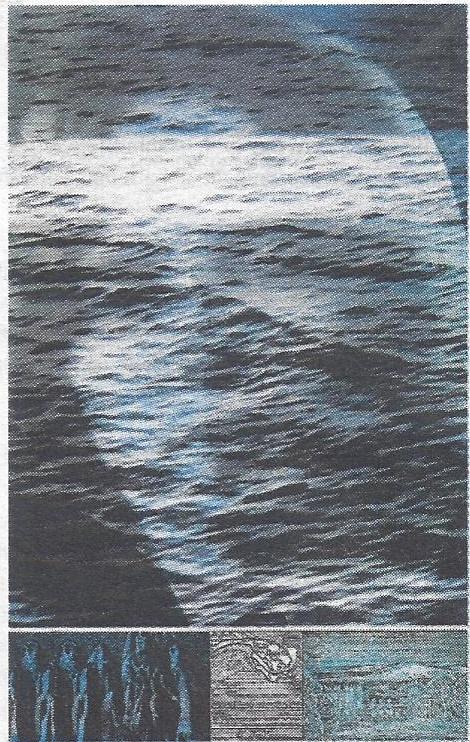
Manly Tears
We recall the time at school
when our treasured anthology of love poetry was seized by the class
bully. We tried to snatch it back but failed. Dusting ourselves off,
we shouted into the face of our aggressor: "There is a pleasure in poetic
pains that only poets know". We then resolved to take up boxing. If only
we'd been armed with a copy of Poems That Make Grown Men Cry
by Anthony and Ben Holden - proof that verse isn't just for sissies.
Here, 100 "real men" reveal they too can be reduced to tears by a tender
rondel, a stirring sestina. The book aims to explode apparent myths about
"gender stereotyping". According to Kate Allen, the British director
of Amnesty International, with whom the publishers have collaborated,
"we hope that this anthology will encourage boys, in particular, to
know that crying - and poetry - isn't just for girls".
Suitably emboldened, and armed with our best handkerchief,
we perused the collection. Within its manly pages we found plenty of Hardy,
Housman, Heaney and Larkin, several of the usual Romantic suspects and
a predictable selection of First World War poetry. Two tearful contributors
chose Bertolt Brecht, two Derek Walcott; others picked Craig Raine and
Harold Pinter, Pablo Neruda and Tony Harrison ("the most important English
poet of the latter half of the twentieth century", according to Daniel
Radcliffe). We were intrigued to see the poker player James McManus select
a passage from James Joyce's "prose poem" Finnegans Wake
("and weary I go back to you my cold father ... "). Gender stereotypers
will be interested to learn that men outnumbered women by ten to one.
In the end, the gong for sobbing went to W. H. Auden. Auden has made Simon
Schama, Simon Callow, Salman Rushdie, William Boyd, Alexander McCall Smith
and Rowan Williams cry. "Lullaby" was the chief culprit (Callow: "I still
find it impossible to utter out loud or even to read to myself the opening
two lines without breaking down"; Schama: "It is the honesty embedded amidst
sheets and on the pillow that makes the eyes prick and the heart knock").
We were relieved that no one - not even Richard Curtis - chose "Funeral
Blues". Curtis selected Heaney's "A Call"; Heaney picked Hardy's "The Voice".
"We hope that readers may set each other off as they read these verses aloud
to one another", writes Ben Holden in his introduction. His wish may come
true on April 29, when several of the contributors will read from the collection
at the National Theatre. We understand that women, too, are welcome. In
the meantime, Poems That Make Grown Men Cry is available from Simon and
Schuster for £16.99.
Some weep at its poignancy;
others at its complexity. All can be grateful for a handsome new edition
of Finnegans Wake illustrated by John Vernon Lord and now
available from the Folio Society for £99. Previous projects by the artist
include illustrated versions of The Nonsense Verse of Edward
Lear and Lewis Carroll's "The Hunting of the Snark". It seems appropriate
that the original TLS review of Finnegans Wake from May 6,1939
boggles at Joyce's "Jabberwockian form".
The scene pictured comes from the final section of the novel
that caused James McManus such distress. The face of Anna Livia Plurabelle
I (in this case represented by a photograph of Joyce's wife, Nora) merges
with the River Liffey. The strip of light across her forehead alludes
to the line "This baylight's growing".
TLS April 4, 2014
Thơ làm đàn ông nhỏ lệ. Poems That Make Grown Men Cry.
Nếu bạn ở Luân Đôn, có thể
tham dự đêm thơ này, 29 Tháng Tư 2014, Nhà Hát Thành Phố.
Phụ nữ cũng có thể tham dự.
Chúng tôi hy vọng tập thơ này sẽ khuyến khích mấy cậu thanh niên biết, khóc, và tất nhiên, thơ, không chỉ dành cho mấy em, "we hope that this anthology will encourage boys, in particular, to know that crying - and poetry - isn't just for girls".
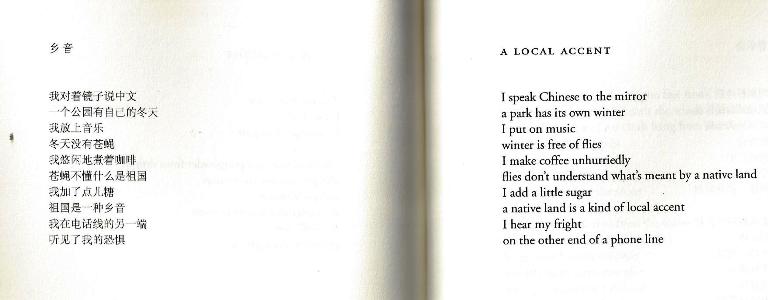
Gấu nói giọng Bắc Kít với cái
gương
Công viên có riêng mùa đông của nó
Gấu vặn nhạc
Mùa đông thì làm gì có ruồi
Chậm rãi làm ly cà phê
Ruồi, Bọ, VC... thì làm sao hiểu quê hương là [cái đéo] gì,
Hà, hà!
Thêm tí đường
Quê hương là 1 giọng Bắc Kít,
Nghe nhói 1 phát
Ở bên kia đầu phôn.
Ui chao, đúng là nhói 1 phát
thật, khi lần đầu gọi phôn, nghe cái giọng Bắc Kít, đúng giọng Cô Hồng
Con của 1 làng Bắc Kít, ở ven đê sông Hồng.
Đúng giọng BHD….
Ta bận chồng, bận con, làm gì có thì giờ cho mi…. hà, hà!
Israeli Poems on War and Peace: Yehuda Amichai
Eyes are on the Middle East
again as we enter the holiday season. I have been browsing in a book called
After the First Rain: Israeli Poems on War and Peace (Dryad
Press), edited by Moshe Dor and Barbara Goldberg and translated by a
number of eminent American poets. It begins with a foreword by Shimon
Peres, who recalls in movingly spare and evocative language the ideals
and the assassination of his friend Yitzhak Rabin.
The poems, of course, speak about the tragedy of war and the
longing for peace.
Great poetry doesn't necessarily get made out of important
subjects. But this is an urgent subject, and the poems address it eloquently.
Warweariness, piercing sadness, hope. One of the most eloquent is "Seven
Laments for the War Dead" by Yehuda Amichai. Here is a section of it:
Is all of this
sorrow? I don't know.
I stood in the cemetery dressed in
the camouflage clothes of a living man: brown pants
and a shirt yellow as the sun.
Cemeteries are cheap; they don't
ask for much.
Even the wastebaskets are small, made for holding
tissue paper
that wrapped flowers from the store.
Cemeteries are a polite and disciplined thing.
“I shall never forget you," in French
on a little ceramic plaque.
I don't know who it is that won't ever forget:
he's more anonymous than the one who died.
Is all of this sorrow? I guess
so.
"May ye find consolation in the building
of the homeland." But how long can you go on building the homeland
and
not fall behind in the terrible
three-sided race
between consolation and building and death?
Yes, all of this is sorrow.
But leave
a little love burning always
like the small bulb in the room of a sleeping baby
that gives him a bit of security and quiet love
though he doesn't know what the light is
or where it comes from.
This translation from the Hebrew is by Chana Bloch.
Robert Hass: Now & Then
Thơ ca lớn đếch cần bước ra từ đề tài lớn, nhưng 30 Tháng Tư là một đề tài khẩn, rất khẩn, càng lâu càng trở nên khẩn!
Tất cả những cái điều Gấu vừa lèm bèm đó, là nỗi buồn đó ư?Gấu cũng đếch biết nữa!
Gấu đứng ở nghĩa trang, ăn vận quần áo ngụy trang như là đang còn sống: quần áo rằn ri của lũ Ngụy…
Nghĩa trang thì rẻ mạt: Họ đâu đòi hỏi chi nhiều
Ngay mấy cái giỏ đựng rác cũng nhỏ xíu
Thì chỉ đựng ba giấy gói bông, gói hoa, từ cửa tiệm.
Nghĩa trang mới lịch sự và ngăn nắp làm sao
"Ta sẽ không bao giờ quên mi đâu", Gấu Cái phán, và khắc lên tấm plaque bằng sành.
Nhưng có đúng là mộ Gấu không đấy
Hay là mộ một tên lính Ngụy vô danh nào đó?
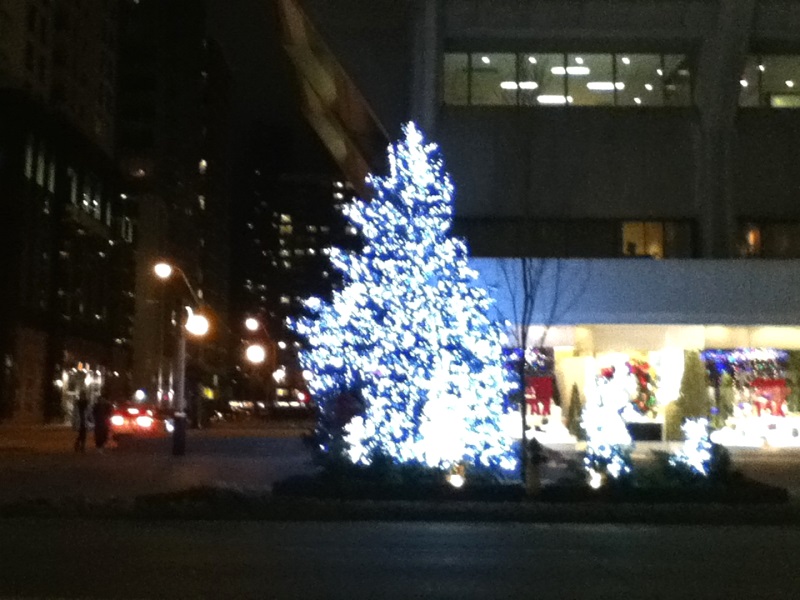

Poems
Poem of Regret for an Old Friend
By Meghan O’Rourke
What you did wasn’t so
bad.
You stood in a small room, waiting for the sun.
At least you told yourself that.
I know it was small,
but there was something, a kind of pulped lemon,
at the low edge of the sky.
No, you’re right, it was
terrible.
Terrible to live without love
in small rooms with vinyl blinds
listening to music secretly,
the secret music of one’s head
which can’t be shared.
A dream is the only way
to breathe.
But you must find a more useful way to live.
I suppose you’re right this was a failure: to
stand there
so still, waiting for—what?
When I think about this
life,
the life you led, I think of England,
of secret gardens that never open,
and novels sliding off the bed
at night where the small handkerchief
of darkness settles over one’s face.
Điều bạn làm thì không quá
tệ
Ở trong căn phòng nhỏ, đợi mặt trời.
Ít ra, bạn biểu bạn, như thế.
Tôi biết, nó nhỏ
Nhưng có cái gì đó, một thứ chanh bột
Ở mép thấp của bầu trời
Không, bạn nói đúng, quả là
khủng khiếp
Khủng khiếp sống, mà không có tình yêu
Trong những căn phòng nhỏ với những màn cửa bằng nhựa
Giấu giếm nghe nhạc
Thứ âm nhạc của cái đầu của mỗi người
Nghĩa là, không thể chia sẻ
Một giấc mộng là cách độc nhất
để thở
Nhưng bạn phải kiếm ra một cách dễ dàng hơn để mà sống
Tôi nghĩ là bạn đúng, đây là 1 thất bại
Cứ đứng đó, đợi - đợi cái gì cơ chứ?
Khi tôi nghĩ về cuộc đời này
Cuộc đời mà bạn đang sống đó
Tôi nghĩ đến xứ Anh Cát Lợi
Đến những cánh vườn bí mật chẳng bao giờ mở cửa
Và những cuốn tiểu thuyết rớt khỏi giường
Vào ban đêm
Khi cái khăn tay nhỏ xíu
Của bóng tối
phủ lên mặt của 1 con người.
Note: Bài thơ mới nhất, trên
số báo mới nhất, đầu năm, 4 Tháng Giêng, của tờ The New Yorker.
Chôm liền!
Poems July 6, 2009 Issue
A Dream
By Jorge Luis Borges
http://www.newyorker.com/magazine/2009/07/06/a-dream-3In a deserted place in Iran
there is a not very tall stone tower that has neither door
nor window. In the only room (with a dirt floor and shaped like
a circle) there is a wooden table and a bench. In that circular
cell, a man who looks like me is writing in letters I cannot understand
a long poem about a man who in another circular cell is writing a
poem about a man who in another circular cell . . . The process never
ends and no one will be able to read what the prisoners write.
(Translated, from the Spanish, by Suzanne
Jill Levine.)
Tại 1 nơi hoang tàn ở Iran,
có 1 cái tháp không cao cho lắm, không cửa ra vào, không cửa
sổ. Ở căn phòng độc nhất (sàn tròn tròn, dơ dơ), có 1 cái
bàn gỗ, 1 cái băng ghế. Trong cái xà lim tròn tròn đó, một
người đàn ông trông giống Gấu, đang ngồi viết, bằng 1 thứ chữ Gấu
không đọc được, một bài thơ dài về 1 người đàn ông ở trong 1 xà lim
tròn tròn khác đang viết một bài thơ về một người đàn ông ở trong
1 xà lim tròn tròn khác… Cứ thế cứ thế chẳng bao giờ chấm dứt và chẳng
ai có thể đọc những tù nhân viết cái gì.
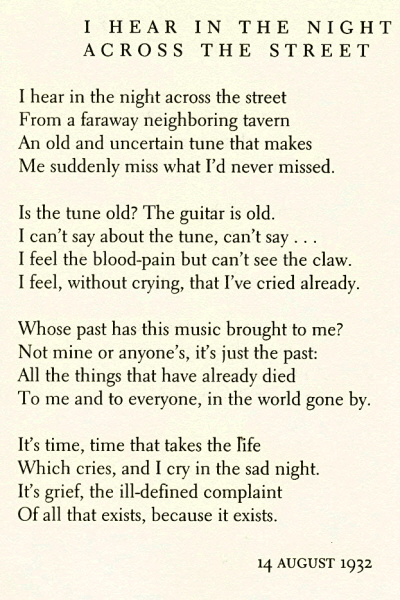
Tôi
nghe trong đêm, qua con phố,
Xa thật xa,
Từ một quán hầm cũng khu lối xóm,
Một điệu nhạc xưa, không rõ ra là từ một
bản nhạc nào.
Nó làm tôi bất thình lình nhớ ơi là
nhớ
Điều mà tôi chẳng bao giờ nhớ.
Điệu nhạc
xưa ư? Cây ghi ta cũ
Tôi không thể nói gì về điệu nhạc, chịu
thua…
Tôi cảm thấy nỗi đau chạy rần rần trong máu,
nhưng chẳng làm sao nhìn thấy móng sắc thương đau
Tôi cảm thấy, không khóc, mà đã khóc.
Quá
khứ nào, của ai, điệu nhạc mang về cho tôi?
Chẳng phải của tôi, chẳng phải của ai, mà
chỉ là quá khứ
Mọi chuyện đều đã chết
Đối với tôi, đối với mọi ngườì, trong một
thế giới đã bỏ đi
Đó
là thời gian, nó lấy đi cuộc đời
Đời khóc, và tôi khóc, trong một đêm
buồn bã
Đó là nỗi đau, nỗi than van
Về tất cả cõi đời, bởi vì đó là cõi
đời
Pessoa
Dưới cầu Mirabeau, sông
Seine chảy
Và tình đôi ta
Liệu anh phải nhớ
Niềm vui luôn tới, sau nỗi đau
Đêm tới, giờ đổ
Ngày đi, ta ở
Tay trong tay mặt nhìn
mặt
Dưới cầu đôi tay
Sóng uể oải lập đi lập lại
Nhân lên mãi mãi
Ánh mắt thiên thu hoài hoài của đôi ta
Đêm tới, giờ đổ
Ngày đi, ta ở
Tình đi, như nước chảy
Tình đi
Ôi, đời sao chậm lụt
Hy vọng sao hung bạo đến như vầy
Đêm tới giờ đổ
Ngày đi, ta ở
Ngày đi, tháng đi
Thời gian không đi
Tình không bao giờ trở lại
Dưới cầu Mirabeau sông Seine chảy
Đêm tới, giờ đổ
Ngày đi, ta ở
NQT dịch
sông khơi dòng trên tấm toan
thời xa
cây xanh lục hai bên bờ, thuyền buồm giữa dòng,
cánh tay quăng lưới vào khoảng không
đêm xóm cồn, trăng soi, cá quẫy nước
những con người thời xưa, khăn áo lạ lẫm
chợ họp bến sông, ồn ã rạng đông
sương còn lạnh áo người khua tay chèo
trưa, theo gió nam, một tiếng ru thời gần, nghe quen
nhắn người đi xa trở về, con ve kêu mùa hạ
(rằng, biết mấy thu nguôi lòng)
tìm lại người chuyện trò, cây già, quán cũ
cúi đầu dòng chữ hoen, trang sách ố
có rủ nhau về, nhấp chén rượu bên bãi dâu, trong
gió mùa
vài lá thuyền gieo neo về một bến vắng chưa xa..
Huế, 11.2011
Dã Viên
Tks. NQT
Câu thơ đầu của
bạn làm Gấu nhớ đến Borges, và đoạn vừa đọc, trong Ngón
Thơ, This Craft of Verse, và cũng đã chôm 1 câu đưa lên Tin
Văn.
Borges nhắc đến câu thơ của Tennyson, trong 1 bài
thơ làm khi mới 13, 14 tuổi, dục bỏ, destroy, nhưng may sao còn
1 câu: Thời gian trôi
nửa đêm, Time flowing in the middle of the night. Và Borges
khen cậu bé Tennyson chọn chữ cực khôn. Nửa đêm, im ắng, người ngủ,
tuy nhiên sông vưỡn trôi không 1 tiếng động...
Bữa nay, lạ làm sao đọc lại, thì nó lại bật ra dòng thơ của Apollinaire:
Đêm
tới, giờ đổ,
Ngày đi ta ở!
Vienne la nuit sonne l'heure
Les jours s'en vont je demeure
Cũng trong đoạn trên, trong
bài viết về "Ẩn dụ", Borges nhắc tới 1 cuốn tiểu thuyết, giản dị có cái tên,
Of Time and the River
[còn có 1 bài hát cùng tên, thật
tuyệt Gấu thật mê, khi mới lớn, Nat King Cole ca (1)
].
Thời gian, dòng sông, cả hai cùng trôi…
Và tất nhiên, Borges bèn lôi câu nổi tiếng của
nhà thơ Hy Lạp: Chẳng ai có thể tắm hai lần trong cùng dòng sông,
No man steps twice into the same river.
Nhưng đến đây, thì Borges đổi giọng:
Ở đây, chúng ta có cái
khởi đầu của sự ghê rợn. Here we have the beginning of terror.
Bởi là vì lúc thoạt đầu, at first, chúng ta
nghĩ đến dòng sông trôi, những giọt nước khác nhau…
Và rồi chúng ta được làm ra để mà nghĩ rằng,
chúng ta là con sông, và chúng ta cũng “phiêu”
như là con sông!
And we are made to feel that we are the river,
that we are as fugitive as the river.
Tuyệt!
Hai dòng thơ của Apollinaire, ngược hẳn lại:
Đêm
tới, giờ đổ
Ngày đi, ta ở
Và rồi:
L'amour s'en va comme cette
eau courante
L'amour s'en va
Comme la vie est lente
Et comme l'Espérance est violente
Tình bỏ đi như nước sông
chảy
Tình bỏ đi
Đời sao chậm như rùa
Và hy vọng mới hung bạo làm sao!
*
Về bài thơ của bạn, Gấu mê mấy dòng cuối:
cúi đầu dòng chữ hoen, trang sách ố
có rủ nhau về, nhấp chén rượu bên bãi dâu, trong gió mùa
vài lá thuyền gieo neo về một bến vắng chưa xa.
Tuyệt. Nhất là
dòng cuối, "gieo neo về", "bến vắng chưa xa".
Thơ bạn rất lạ, tuy cùng trong không khí thơ Tàu.
NQT
Note: Thay vì lời chúc đầu năm mới, tới tất cả bạn đọc TV, thì là những dòng thơ trên:
Ôi, đời sao quá chậm,
Mà hy vọng sao hung bạo đến như thế này!
Note: Nhắc tới Nat King Cole, Bác Gúc [AP News] vừa loan tin, cô con gái của ông, Natalie Cole, 65 tuổi, mới mất.

LOS ANGELES (AP) — Singer
Natalie Cole, the daughter of jazz legend Nat “King” Cole who carried
on his musical legacy, has died.
Publicist Maureen O'Connor says Cole died Thursday night.
She was 65. O'Connor had no details about how or where Cole died.
Cole had battled drug problems and hepatitis that forced
her to undergo a kidney transplant in May 2009.
Cole’s 1991 album, “Unforgettable … With Love,” sold
some 14 million copies and won six Grammys. It featured reworked
versions of some of her father’s best-known songs.
On the title cut, “Unforgettable,” she sang along with
her father’s taped version to create a memorable duet.
Nat “King” Cole died of lung cancer in 1965.

crocus ...
We went shopping for hearts at the flower girl's booth:
they were blue and they opened up in the water.
It began to rain in our room,
and our neighbour came in, Monsieur Le Songe, a lean little man.
We played cards, I lost the irises of my eyes;
you lent me your hair, I lost it, he struck us down.
He left by the door, the rain followed him out.
We were dead and were able to breathe.
Đôi ta đi mua tâm hồn ở ki-ốt hoa của 1 cô gái
Hoa thì xanh và chúng mở ra một vùng nước
Trời bắt đầu mưa ở trong phòng của chúng ta
Và người hàng xóm bước vô, Ông Mộng Mị, một người đàn ông nhỏ con, gầy ốm
Chúng tôi chơi bài. Tôi thua cặp tròng đen; em cho tôi mượn mái tóc, tôi lại thua, anh ta vét chúng tôi đến cạn láng
Anh ta đi ra cửa, cơn mưa theo anh ra ngoài
Chúng tôi chết, và có thể thở.
when a conversation
is almost a crime
because it includes
so much made explicit?
gửi Bertolt Brecht
Khi tán gẫu là một tội
Bởi là vì nó bao gồm quá nhiều điều
Nhờ tán gẫu mà trở thành dứt khoát?
dove-coloured as yesterday,
snowfall, as if even now you were sleeping.
White, stacked into distance.
Above it, endless,
the sleigh track of the lost.
Below, hidden,
presses up
what so hurts the eyes,
hill upon hill,
invisible.
On each,
fetched home into its (oday,
an I slipped away into dumbness:
wooden, a post.
There: a feeling,
blown across by the ice wind
attaching its dove- its snow-
coloured cloth as a flag.
Lay those words into the dead man's grave
which he spoke in order to live.
Pillow his head amid them,
let him feel
the tongues of longing,
the tongs.
Lay that word on the dead man's eyelids
which he refused to him
who addressed him as thou,
the word
his leaping heart-blood passed by
when a hand as bare as his own
knotted him who addressed him as thou
into the trees of the future.
Lay this word on his eyelids:
perhaps
his eye, still blue, will assume
a second, more alien blueness,
and he who addressed him as thou
will dream with him: We.
Marina Tsvetayeva
[Paul Celan trích dẫn làm tiêu đề cho 1 bài thơ của ông]
Mọi thi sĩ là... Ngụy!
Đúng ý Vương Đại Gia, Vương Trí Nhàn, "May mà có Ngụy"!
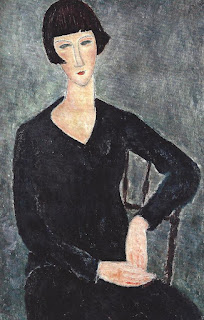


Comments
Post a Comment